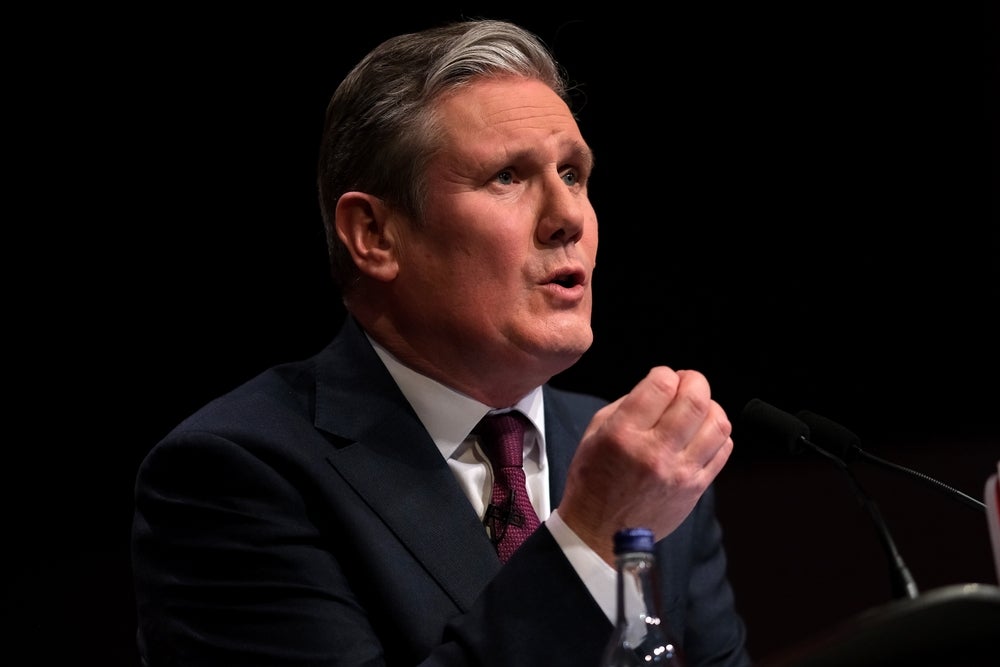
Sir Keir Starmer and the Labour Party have won an astonishing landslide in the 2024 UK general election. While they celebrate, the markets will react to Labour and the election, but what will the experts say?
Tim Middleton, Director of Policy and External Affairs, the PMI
The PMI would like to offer its congratulations to Sir Keir Starmer on his victory last night. There are many reforms required to the UK pensions system. Some, such as the new Defined Benefit Funding Code and changes to auto-enrolment, remain from the agenda of the previous Government. Others stem from the Labour Party manifesto: the new Government has committed itself to a review of the UK pension system, and we would greatly appreciate clarity as to what this review will address. In particular, we look forward to the appointment of a new Pensions Minister, who we greatly look forward to meeting in order to discuss the next chapter for pensions provision in the UK.
Tom Minnikin, partner, Forbes Dawson
Labour will enjoy celebrating their victory in the general election today, but it would be wise for them not to get too complacent.
The burden of tax is at the highest level for a generation. With strains on public spending increasing all the time, Rachel Reeves has a tightrope to walk over the coming years to keep the electorate happy.
How well do you really know your competitors?
Access the most comprehensive Company Profiles on the market, powered by GlobalData. Save hours of research. Gain competitive edge.

Thank you!
Your download email will arrive shortly
Not ready to buy yet? Download a free sample
We are confident about the unique quality of our Company Profiles. However, we want you to make the most beneficial decision for your business, so we offer a free sample that you can download by submitting the below form
By GlobalData“The NHS and social care are areas where demands on the Exchequer will continue rising, as the UK grapples with an ageing population. Combined with the pressure to commit more money to defence – in light of tensions in the Middle East and war in Ukraine – the new chancellor has a tough job on her hands.
Only time will tell whether the decision to commit to the ‘triple lock’ freeze on increasing income tax, National Insurance and VAT, was a wise move. Labour criticised the Conservatives for stealth taxes, so leave themselves exposed to accusations of hypocrisy if they follow the same path.
When it comes to potential tax rises, we will be keeping a close eye on capital gains tax and inheritance tax – two areas Labour failed to provide firm commitments to in their manifesto.
More generally though, the incoming Government need to be honest with the electorate about the state of the public finances – something which this election campaign has arguably failed to draw out.
The reality is that the celebrations may be short-lived as the hard work now begins.
Dan Boardman-Weston, Chief Executive, BRI Wealth Management
The Labour Party has won the general election with a forecast majority of 180 seats. While the result will not have come as a surprise to many, it represents a dramatic reversal of fortunes for both parties since the 2019 election, when the Conservative Party won a majority of 80 seats. We have experienced a significant degree of political turmoil over the past decade, and hopefully, this will mark the start of a quieter period for the nation. Keir Starmer begins his tenure as the 58th Prime Minister of our country with an unenviable list of challenges, but hopefully, he and his team will deliver the change and growth they have promised.
The market reaction to the news of a Labour victory was deafeningly silent, which is not surprising given what the polls and betting odds have been suggesting for some time, and the fact that both parties are quite similar from a fiscal policy perspective. As of 8:15 am, the FTSE 100 is up 0.3%, the FTSE 250 is flat, while Sterling is slightly firmer. UK government bonds rose slightly in value, with the yield on the 10-year gilt down to 4.17%. While the market impact is minimal, there is growing evidence and hope that UK markets are beginning to turn the corner.
Labour has been relatively clear that certain taxes will have to rise, such as VAT on private school fees and increased taxes for non-doms. They have also stated that certain taxes will not be raised, mainly the general level of VAT, national insurance, and income tax, though the freezing of income tax thresholds will mean more people are paying more tax. The aforementioned taxes that are not going to be increased account for roughly 75% of the overall £830bn collected in taxes by His Majesty’s Government. That still leaves 25% of the tax take that could be subject to increases, especially as Labour has not been as clear about them. It is important not to try and pre-empt potential tax increases too much, and these remaining taxes are unlikely to be addressed until the Budget, which is expected in October. I will briefly review some of the main areas where we may see tax increases, in the hope of providing some insight.
Capital gains tax (CGT) makes up a relatively small proportion of the tax take in the UK (£16bn or about 2%) and is levied on profits made on certain investments. The current rates vary between 10% and 28%, and the annual exempt amount of gains is typically £3,000, down from £12,300 several years ago. There has been speculation for some time that CGT rates may move up to a flat rate of tax in the 30-35% range, or that they may be aligned with marginal income tax rates, i.e., 20%, 40%, or 45%. Labour has re-imagined itself as a pro-business party over the past few years, so I would find it difficult to see them increasing CGT rates for business owners, as this would negatively impact the economy. However, it is plausible that they could raise rates for ownership of listed shares and for people with multiple properties (whether rented or second homes). The trouble with this is that it would have a knock-on impact on certain parts of the economy and capital markets, and research suggests that moving CGT rates too high may actually lower the overall amount of tax collected, as asset owners become more strategic about how and when gains are realised. On the balance of probabilities, I think we will see some increase in CGT rates over the course of the next Parliament.
The benefits of ISAs are well known by the public, whether they are stocks and shares ISAs or cash ISAs. The current allowance is £20,000 per annum, which allows individuals to shelter assets from income tax or CGT. There had been some progress in the previous Parliament about increasing the allowance by £5,000 if that extra allowance was invested in the UK stock market. This was a relatively sensible policy, but it is likely to be scrapped given other priorities on the legislative agenda. I think it is unlikely that they will remove the £20,000 allowance, but also unlikely that it will rise above £20,000, given that the majority of individuals do not manage to save £20,000 into an ISA each year. It is a shame that it is unlikely to increase, as the annual allowance looks low compared to other countries’ equivalents of the ISA, and we should be encouraging more of a saving and investing culture within the UK.
The government has been trying to foster a culture of saving for retirement, with the advent of auto-enrolment into pensions in 2012, pension freedoms, and the tax relief that is available to those saving into a pension. The government adds an amount equal to the basic rate of tax (20%) to pension contributions, and further relief is available to higher and additional rate taxpayers via their tax return. In simple terms, to put £100 into your pension, it costs a basic rate taxpayer £80, a higher rate taxpayer £60, and an additional rate taxpayer £55. This relief, along with some other associated reliefs, costs over £50bn each year, a huge sum compared to many other taxes. Labour has not been clear about their intentions for tax relief on pension contributions, though they have stated that they will not do anything with the much-coveted tax-free cash that pensions can provide at retirement. I think there is a chance that Labour may abolish tax relief at your marginal rate of tax (i.e., 40% or 45%) but introduce a flat rate of relief at maybe 30%. This would benefit basic rate taxpayers but penalise higher and additional rate taxpayers. Doing so would likely provide billions of pounds for the government while being popular with some. Saving for retirement is vitally important, and I hope that the government does not put barriers in place that could lead to lower savings for retirement.
Finally, inheritance tax (IHT) has not really been mentioned much in the election campaign, but it may come to the fore during this Parliament. IHT is levied on about 4% of estates and raises around £8bn each year. IHT is one of the most hated taxes in the UK, as many people feel that they have paid taxes all their lives, and then the government takes 40% of their estate. Clearly, it is not as simple as that, and exemptions are in place that mean tax is only payable at 40% above a threshold of £325,000 to £1m, depending on your circumstances. There are plenty of legitimate ways that people can structure their affairs to minimise the amount of IHT that is payable on death, and some of these provide much-needed support to small companies and vital industries such as renewable energy. Changing IHT rules would significantly impact these parts of the economy and would likely cause much more damage than the increased tax receipts might provide. It is likely that a reform of IHT is relatively low on Labour’s agenda, if present at all, but it is worth contemplating what the future of the tax may look like.
There are several areas where a Labour government may seek to raise taxes, but hopefully, they will take a pragmatic approach. However, if they can revitalise the UK economy, then large tax increases may not be required at all. I am sure we are all hoping that the new government can deliver on its promises of change and growth and that I will not be penning another election article for another five years.
Susannah Streeter, head of money and markets, Hargreaves Lansdown
It’s a Labour landslide victory bringing in a political new guard which has vowed to make big changes to the UK economy, but given poll forecasts the result has caused few ripples on financial markets. The FTSE 100 was in positive territory in early trade and the pound was largely unchanged against the dollar, as the exit polls came in and lifted only very slightly as the overall result became clear, hovering around $1.276. The lack of movement was unsurprising given that the overall result had already been priced in. However, the domestically focused FTSE 250, gained more ground, with a little more confidence swirling about the UK’s prospects. Nevertheless, with an estimated 35% of the vote, Labour still took the lowest share for a governing party in history. There may be a honeymoon period for the new administration, but then difficult decisions will have to be taken in office. The size of the victory and the upswell of support for smaller parties and independents will leave Labour MPs concerned about the safety of their seats at the next election. They know they have to deliver for the electorate but are likely to be hampered by a commitment to be fiscally responsible and restrain spending.
The priority will be keeping the markets unruffled in the first days, weeks and months of the new administration and not overdoing spending pledges. There may be some tinkering with the borrowing rules at some point in the future, to distinguish between day-to-day spending and investment, to propel long term growth, potentially loosening the purse further ahead. So far, this doesn’t seem to have perturbed the debt markets, with bond investors still appearing to be more sensitive to interest rate speculation than the investment plans of an incoming government. 10-year gilt yields barely changed as the exit poll results came in, hovering around 4.2%, down from almost 4.7% last October.
This result comes on the heels of a steady rise for the UK market, retaking its crown as Europe’s most valuable for the first time in nearly two years last month. With political turmoil in France now taking centre stage, the UK looks finally set to enter into a period of financial stability which has the potential to spark renewed investor interest in UK assets.
Before the dust settles around UK pollical results, feverish speculation is swirling about the upcoming US Presidential elections and whether Joe Biden will stand down. There are reports that the President is mulling whether to stay in the race, with key donors calling for him to withdraw. The Nasdaq and New York Stock Exchange were closed for the Independence Day Bank holiday, but stock futures seem for now to be shaking off this fresh uncertainty about who will be in the race for the White House, with futures indicating that the S&P potentially heading for another record. Right now, investors are much more focused on the upcoming key monthly jobs data due later in the US, which is expected to show that the pace of hirings slowed in June, which would fuel hopes that an interest rate cut from the Fed is closer on the horizon. However, an interview Joe Biden has filmed with ABC, which is due to be broadcast on Friday will be closely scrutinized for any further deterioration in performance and the success of a number of other appearances from the weekend onwards, including the NATO summit in Washington is considered to be potentially make or break for his chances.
Brent Crude has dipped slightly but is still hovering near the highest levels in two months and is on course to gain around 3% this week. Oil prices have been held up by ongoing supply disruption concerns and expectations of higher demand, as interest rate cuts in the US are again eyed on the horizon. Minutes of the previous Fed meeting released this week show policymakers assessed that price pressures were diminishing, adding to hopes for an easing of monetary policy this year. This has led to renewed expectations of higher demand for energy, just as the US holiday season gets into full swing, and gasoline guzzlers hit the roads. Traders are also eyeing up potential supply constraints as the damage of hurricane Beryl is assessed and more fierce storms are expected which have the potential to cause damage to refinery capacity in the US.
Isabel Albarran, Investment Officer, Close Brothers Asset Management
Today’s long-expected Labour majority will likely to be welcomed by the UK market, providing a much-needed dose of certainty to the country’s politics. We have already seen an impact ahead of the election, with flows into UK assets having strengthened over the last month, but for this to become a sustainable trend, the UK’s growth prospects need to improve.
The scale of Labour’s win is remarkable, as is the revival in support for smaller parties, such as the Liberal Democrats and Reform UK. While a significant win for Labour limits the influence of the left of the party, the Conservatives are likely to move to the right, to challenge Reform UK.
At a sector level, today’s result mandates Labour to implement significant changes, but this will take time. Nonetheless, measures such as proposed planning reforms to the housebuilding sector, increases in renewable energy generation, and the formation of GB Energy will impact markets over the longer term.
While the immediate market impact of today’s, well anticipated, election result has so far been negligible, policy announcements later in the year could move the needle. Today’s cabinet appointments will give us a first glimpse of the policy agenda, and the King’s Speech later this month will set the tone for the new Parliament, while the European Political Community meeting will give a sense of how relations will go with Europe. Crucially, the Autumn Budget, likely to come in September or later, will give us the best indication of the true impact of today’s result on markets, providing the key fiscal decisions ahead of the December Spending Review deadline.







